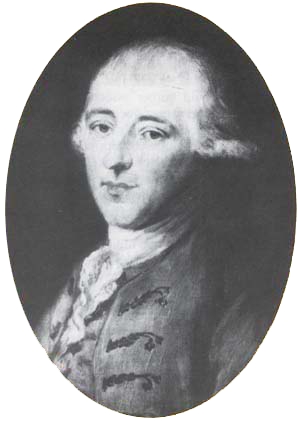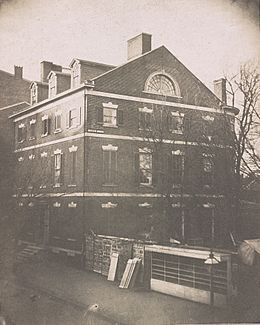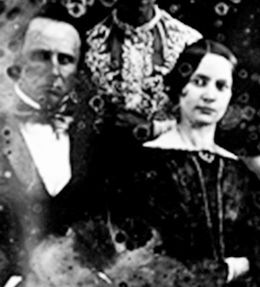Pierce Butler facts for kids
Quick facts for kids
Pierce Butler
|
|
|---|---|
 |
|
| United States Senator from South Carolina |
|
| In office March 4, 1789 – October 25, 1796 |
|
| Preceded by | Inaugural holder |
| Succeeded by | John Hunter |
| In office November 4, 1802 – November 21, 1804 |
|
| Preceded by | John E. Colhoun |
| Succeeded by | John Gaillard |
| Delegate from South Carolina to the Congress of the Confederation | |
| In office May 25, 1787 – September 17, 1787 |
|
| Personal details | |
| Born | July 11, 1744 Garryhundon, County Carlow, Kingdom of Ireland |
| Died | February 15, 1822 (aged 77) Philadelphia, Pennsylvania, US |
| Resting place | Christ Episcopal Church and Churchyard, Philadelphia |
| Political party | Federalist, Democratic-Republican |
| Spouse | Mary Middleton |
| Children | 8 |
| Parents | Sir Richard Butler, 5th Baronet Henrietta Percy |
| Profession | Soldier, planter |
| Military service | |
| Allegiance | Great Britain United States |
| Branch/service | British Army South Carolina militia |
| Rank | Adjutant General Major (combat rank) |
| Battles/wars | American Revolutionary War |
Pierce Butler (July 11, 1744 – February 15, 1822) was an important figure in early American history. Born in Ireland, he became a rice planter and politician in South Carolina. He was a soldier in the American Revolutionary War and is known as one of the Founding Fathers of the United States.
Butler served in various government roles. He was a state legislator and a member of the Congress of the Confederation. He also helped write the Constitution of the United States at the 1787 Constitutional Convention. Later, he became a U.S. Senator.
He owned many enslaved people and supported their owners' rights. He helped create the Fugitive Slave Clause in the U.S. Constitution. This clause protected the property rights of slaveholders. He also wanted to count all enslaved people for state population totals. This would give Southern states more power in Congress. The Three-fifths Compromise later counted only three-fifths of the enslaved population. This still gave Southern states more power than if only free people were counted.
Contents
Growing Up in Ireland
Pierce Butler was born on July 11, 1744, in Garryhundon, County Carlow, Ireland. His family was part of the Anglo-Irish Protestant group. He was a member of the Anglican Church. After the American Revolution, he joined the Episcopal Church, like many other Founding Fathers.
He was the third son of Sir Richard Butler and Henrietta Percy. In 1773, he left the British Army. He then moved to South Carolina with his wife, Mary.
A Soldier in the Revolution
In early 1779, South Carolina's Governor John Rutledge asked Butler for help. Butler had been a British soldier, but now he was asked to organize South Carolina's defenses. He became the state's adjutant general, a high-ranking military position. However, he preferred to be called "major," which was his highest combat rank.
At this time, Britain changed its war plans. Their forces in the northern colonies were stuck. There was also a chance that France would join the war to help the Americans. So, the British decided on a "southern strategy." They thought many Loyalists in the South would support them. They planned to conquer the colonies one by one, starting with Georgia. They captured Savannah in December 1778.
Butler helped gather South Carolina's militia to fight the British invasion. He also helped prepare state units to push the British out of Georgia. During a counterattack on Savannah, Butler volunteered to help General Lachlan McIntosh. The American militia was not as well-trained as the British. The effort to free Savannah failed.
In 1780, the British captured Charleston, South Carolina. They also captured most of the colony's government and army. Butler managed to escape with a group of commanders. For the next two years, he worked on a plan to defeat the British in the South. He refused to give up. Allies in South Carolina and parts of Georgia and North Carolina started a resistance movement.
As adjutant general, Butler worked with former militia members. He also worked with Continental Army veterans like Francis Marion and Thomas Sumter. He helped combine their efforts into one campaign. They joined forces with the southern Army, first under Horatio Gates and later under Nathanael Greene.
Because Butler had been a British officer, the British forces targeted him. He narrowly avoided capture several times. During the final part of the southern campaign, he gave his own money and supplies. This helped support the American forces. He also helped manage facilities for prisoners of war.
Becoming a Politician
After the Revolutionary War, Butler was not wealthy anymore. Many of his farms and ships were ruined. The international trade that brought him most of his money was also in chaos. He went to Europe to get loans and find new markets.
In late 1785, Butler returned to the United States. He spoke out for peace with former Loyalists. He also supported equal representation for people living in the backcountry. South Carolina's legislature chose Butler to represent the state. He attended the Constitutional Convention in Philadelphia in 1787. At the convention, he suggested that the president should have the power to start wars. However, no one supported his idea, and it was rejected.
Butler's experiences as a soldier and farmer-legislator made him support a strong union of the states. But he also looked out for the interests of his region. He introduced the Fugitive Slave Clause (Article 4, Section 2). This clause protected slavery in the Constitution. He also supported a part of the Constitution that stopped the government from regulating the international slave trade for 20 years. He wanted to count all enslaved people for Congress's population totals. He later agreed to count three-fifths of them. This helped Southern plantation owners have a strong voice in national politics for many years.
Butler sometimes seemed to change his mind. He supported the Constitution but did not go to the South Carolina meeting that approved it. Later, he was elected to the United States Senate three times. He also changed his political party. He started as a Federalist but switched to the Jeffersonian party in 1795. In 1804, he said he was politically independent. After these changes, voters did not elect him to national office again. However, they elected him to the state legislature three more times.
In September 1804, Vice President Aaron Burr stayed at Butler's plantations. Burr was avoiding public attention after a duel with Alexander Hamilton. Burr traveled under a fake name, Roswell King, who was Butler's overseer. During Burr's visit, a terrible hurricane hit the area. Burr wrote about his stay and the storm.
Later Life and Family
After his wife died in 1790, Butler sold his land in South Carolina. He invested in plantations on the Sea Islands of Georgia. He hired Roswell King to manage his two plantations on St. Simon's Island and Butler Island. Butler wanted his enslaved people treated more kindly than King preferred. King left in 1820 to start his own plantation.
Butler retired from politics in 1805. He spent much of his time in Philadelphia, where he had a summer home. Through his business deals, Butler became one of the richest men in the United States. He owned large amounts of land in several states. Like other Founding Fathers from his region, Butler continued to support slavery. However, unlike some, he never admitted that supporting freedom for people while also supporting slavery was a contradiction.
People described Butler as "unusual" and a "mystery." He followed his own ideas to give the most freedom and respect to those he considered citizens. He wanted a strong central government. But he also wanted a government that would not ignore the rights of regular people. He disagreed with the policies of the Federalists because he thought they ignored the interests of people in the western areas. He later disagreed with Jefferson and the Democrats for the same reason. Butler believed in the importance of the common person. Late in his life, he said, "Our System is little better than [a] matter of Experiment. ... much must depend on the morals and manners of the people at large."
Butler's Children and Grandchildren
In January 1771, Butler married Mary Middleton (around 1750–1790). She was an orphan and inherited a large fortune. They had eight children, but only four daughters lived to adulthood. Only one daughter, Sarah Mease, married and had children.
Butler decided to leave his wealth to his daughter Sarah's three sons. They had to change their last name to 'Butler' to inherit. Two of Sarah's sons, John Mease and Pierce Butler Mease, changed their names.
John A. Mease Butler
John A. Mease Butler (1806–1847) inherited half of his grandfather's plantations. He married Gabriella Morris, but they had no children. He fought in the Mexican–American War but died from illness. His wife Gabriella continued to live on his estates. During the American Civil War, Union forces took over the Butler plantations. In 1863, the Emancipation Proclamation freed Gabriella's nearly 500 enslaved people. She died later that year.
Pierce Mease Butler
Pierce Mease Butler (1810–1867) inherited the other half of his grandfather's plantations. He also changed his last name to 'Butler'. He married Fanny Kemble, a famous English actress, in 1834. They lived in Philadelphia and had two daughters.
Fanny Kemble kept a journal about her time on one of their plantations. She was horrified by the lives of enslaved people. She wrote about how hard they worked and how the manager, Roswell King Jr., treated them. She noted that King had children with enslaved women. Kemble's experiences made her a strong supporter of abolitionism, the movement to end slavery.
Pierce Mease Butler and Fanny Kemble had many disagreements. He threatened to keep her from their daughters if she published her observations about the plantations. They divorced in 1849, and he kept custody of their daughters.
Kemble waited until 1863, during the American Civil War, to publish her journal. It was called Journal of a Residence on a Georgian Plantation in 1838–1839. Her book showed the harsh reality of slavery.
After the Civil War, Pierce Mease Butler struggled to make money from his plantations. He could not adapt to using paid workers instead of enslaved people.
The Great Slave Auction
By the mid-1800s, Pierce Mease Butler was very rich. But he lost a lot of his money. To avoid going bankrupt, he sold 436 enslaved people. This happened on March 2–3, 1859, at a racetrack near Savannah, Georgia. It was the largest single slave auction in U.S. history. He earned over $300,000 from the sale. This event was widely reported in newspapers. During the Civil War, he stayed in Philadelphia. He was briefly imprisoned in 1861.
Later Generations
After Pierce Mease Butler died, his younger daughter, Frances Butler Leigh, and her husband tried to run the plantations. But they could not make a profit. They moved to England in 1877. Frances Butler Leigh wrote a book called Ten Years on a Georgian Plantation since the War (1883). She defended her father's actions as a slaveholder. This book was a response to her mother's earlier book criticizing slavery.
Pierce Mease Butler's older daughter, Sarah Butler Wister, married a wealthy doctor in Philadelphia. Their son, Owen Wister, became a popular American writer. He is best known for The Virginian, a classic Western novel. Owen Wister was the last of Major Butler's family to inherit the plantations.
Legacy
Pierce Butler and many of his family members are buried in a vault. It is in the cemetery of Christ Church, Philadelphia, a historic landmark. Butler Street in Madison, Wisconsin, is named after him.



